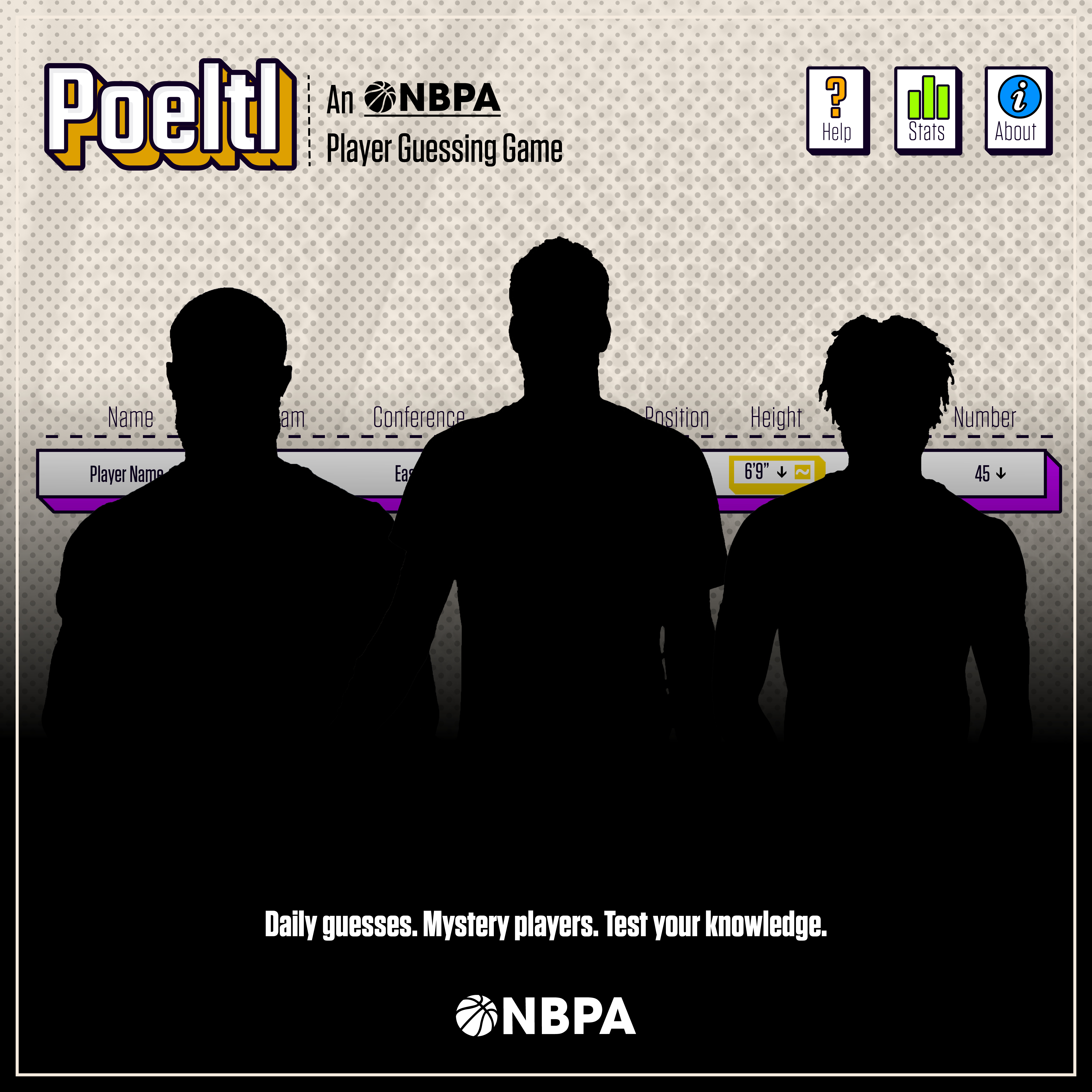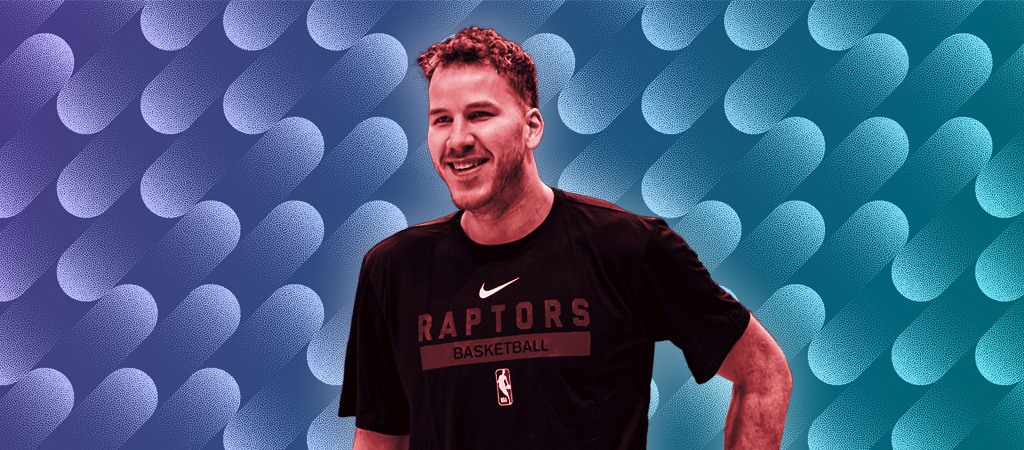A prominent if ironic feature of the late information, or digital age, a time when humans have turned ever more inward, is a large and perhaps occasionally crippling existential awareness. Just about everything you’d ever want or need to know, in some cases what you wish you didn’t, is available to you at all times. The sheer volume of information is at once affirming and conflicting, rewarding and worthless, very fun and strangely depressing. With so many notions about how to live, or the fundamental truths of the world and what we’re doing on it, we’re left with no absolute or discernible truth, pondering the point of it all at the speed of our digital connection.
Another prominent feature of the late information age is Wordle. Or, puzzle games and the seemingly insatiable thirst for them.
How the two features collide over Jakob Poeltl — an affable, 7-foot Austrian center — may not hold the secret to our observational existence, but it does get down to one of existence’s most crucial threads: human connection.
The NBA player guessing game, Poeltl, was launched on February 25, 2022, four months after Wordle debuted and seared deep into the collective psyche. If you’ve never played, Poeltl offers eight guesses to narrow down one current NBA athlete, with categories of team, conference, division, position, height, age, and jersey number for hints. Those categories are highlighted green to indicate a match and help narrow down your next guesses. If a category is highlighted yellow, it means you’re close. If you’re really stuck, there’s also an optional silhouette prompt that reveals a shadowy outline of the person in question.
Gabe Danon, the game’s creator, was a producer on the excellent Dunktown podcast, and a daily player of Wordle. He credits it, and games like it, for offering another way to feel a sense of connection with friends and the wider world, especially when the pandemic loomed large. Danon describes the moment the idea for the game came to him as less of an aha and more of a gratifying click.
“I think it was just a moment where the two things connected in my head, where you could use that kind of mechanic to guess a basketball player instead,” Danon recalls over the phone.
In “a fit of inspiration,” Danon got to work. A web developer by trade, he had a basic prototype by the end of the first day and debuted it to the Dunktown Discord. The group became the game’s beta testers, spotting bugs and offering suggestions for improvement. The name also came from the group, Danon initially used a placeholder of “Basketbadl,” a “terrible name” he’d forgotten about. In two weeks — which is incredibly fast, though Danon says humbly he doesn’t want to claim he did it faster than anyone else could have “but it was certainly my focus at that time” — Poeltl was published on the Dunktown website. Danon figured he’d see a few hundred people pick it up.
“I originally thought of it as something just for listeners to our podcast at the time to enjoy, but, it definitely blew up much bigger than that,” Danon chuckles.
By mid-afternoon on the day it launched, Poeltl’s very first mystery player, Nikola Vučević, had shared his enthusiasm on social media over the debut answer. By the end of Poeltl’s first week public, Danon could see that thousands of people were playing the game at any given time. It was discussed at length on NBA podcasts, Reddit users were sharing and strategizing their best opening tactics, and by March 2022, the NBPA had reached out to Danon. Players also continued to revel in it. Karl-Anthony Towns went live on his YouTube channel to play a round that stretched over a harrowing 10 minutes and had him Googling “nba divisions” and Kyle Lowry’s number — to Towns’ credit, when a viewer told him about the game’s silhouette mode, he immediately and correctly guessed PJ Tucker on his fifth try. Tyrese Haliburton, who had to wait patiently until July 2022, expressed delight when the answer was finally him.
FINALLY🤣
Poeltl 133 – 1/8
🟩🟩🟩🟩🟩🟩🟩🟩
— Tyrese Haliburton (@TyHaliburton22) July 7, 2022
“There was so much excitement around it,” Danon says. “People were sharing it so much. You’d see players posting their scores and saying, when they were the answer for the day, tweeting like, ‘Finally!’”
The feedback remained positive, which in the online NBA world is a bit of an anomaly. Most of the emails Danon got, and still gets, were from people of all ages thanking him for making the game. The most critical feedback remains people telling Danon that heights for certain athletes are incorrect — which, though no doubt annoying, feels endearing in that arguing about an athlete’s physical metrics seems to be the online NBA fan’s Sisyphean task. That persistent quibble is also a good example of what makes Poeltl no small task to maintain.
“The five-letter words in the dictionary don’t change that much, but the rosters in the NBA do,” Danon says.
In other words: Poeltl is a living game. When rookies enter the league or vets leave it, when players are traded and stats shift, the game requires maintenance to reflect those changes. Danon says the game’s constant evolution is what keeps it engaging, but “to maintain a game like that over the course of two years was a lot of work.”
Enter Poeltl. The man. Well, enter again, because he’d already been playing the game.
Jakob Poeltl found the game like most people in the NBA community did: because it was blowing up on social media. Friends and family were also sending it to him. But initially, the strangest thing to Poeltl, the person, about Poeltl, the game, wasn’t just its naming convention.
“I’m a fan of those games and then all of a sudden, there’s a game like that that’s named after me — it’s a weird feeling,” Poeltl says.
Like Danon, Poeltl is a puzzle game aficionado. He plays Wordle, Connections, and other games he deigned too niche to mention daily. He’s such a fan that he’s part of a Toronto Raptors group made up of players and staff dedicated to the competitive pursuit of puzzle games.
“The whole connection with it,” Poeltl continues, “with me enjoying games like that and [Danon],” Poeltl pauses and makes a face that, for lack of an exact word to chronicle the sequence, can only be described as the Alonzo Mourning acceptance GIF — a sort of happily self-effacing look of real-time recognition that what you’re saying ceases to make logical sense even if the emotional truth is there, though there’s probably a German word for it. “He probably doesn’t know that, I don’t know how he would know that I like puzzle games — him picking that name because it sounds like Wordle. The whole coincidence of how it came together is pretty cool, I think, and unique.”
The NBPA thought so, too. Both Danon and the Players Association wanted the game to grow, but after running it himself since the launch, Danon welcomed the operational — and clerical — help the NBPA could offer in taking on the day-to-day operations of the game. Poeltl (the game) never went away, but has now relaunched on the NBPA’s website with an arcade-game style makeover, a global leaderboard, future in-person events and prizes, including physical player memorabilia.

Poeltl (the person) is excited about the opportunity to reinvigorate one of his daily puzzle favorites by “refreshing everyone’s memories.”
“Games like that, they have their ups and downs. They’re trending and everybody’s playing it, then it falls off a bit, and then it comes back for whatever reason. The internet’s a weird place,” Poeltl chuckles. “To try and control or predict what’s going to be popular tomorrow is very difficult. So that’s what I’m really excited about, is with some new updates and promotion, getting the game out there again — people are still playing it — but at its peak, games like that were doing insane numbers.”
The biggest leap, for Danon, is the game’s namesake now acting as its official ambassador — something he calls “incredibly surreal” — and collaborating with him on content and creative operations.
“It wasn’t even something I had ever considered at all, when coming up with the name,” Danon says, when asked about the official relaunch of Poeltl with Poeltl. “It’s very cool for the community around it to grow, and for people to have fun with it. Those kinds of games are such an important part of people’s daily routine now. I can speak for me personally, that it’s probably the first thing I do when I wake up, to wake up my brain, is to play all my puzzles.
“To see that grow and to have the resources of the NBPA behind it,” he continues, “that’s just very rewarding to me.”
There are plenty of existential detours that come in discussing a game named after someone with the person it’s named after; who has gone from occasional enjoyer to habitual participant to creative stakeholder. For example, has Poeltl ever gotten himself in Poeltl? (He hasn’t — “I missed the day, and I know it’s been myself, but I did not participate that day so unfortunately I’ve never gotten myself,” he says.) Also, is he good at it? (He’s confident but pragmatic — he does well in the team’s puzzle group but is sure “extreme NBA fans would crush me at it.”) Is Poeltl a Poeltl purist? (Yes, and says, “I think the silhouette guessing is damn near cheating.”) And does Poeltl ever think about people waking up, firing up Poeltl, and perhaps in some fleeting way, thinking of him? (“It’s probably different for other people, but for me, I don’t look at it and see my name, I more see the game.”)
Though maybe the most existential — that is, relating to the day-to-day experience of existing — is the way that the game has become part of people’s routines and in doing so, shaped our brains.
To be a fan is to already interact with your rooting interests, in athletes or teams, on a daily basis in some capacity. Whether in reading trade news or player profiles, listening to podcasts or watching games, you confer mental and emotional space and the responses that come, from deep in the brain’s limbic system, aren’t necessarily logical but allow for feeling and release. Puzzle games, brief and inconsequential as they seem, light up the frontal lobe and provide finite, solvable experiences. Studies have shown that the more puzzle games you do, and the more variety there is to them, the more synapses your brain creates — making it healthier and better able to ward off cognitive disorders. Essentially, guessing a mystery basketball player is really good for your brain.
Human connection is too. Our brains are hard-wired for it, seeking it out for safety and comfort, to adapt and relate. Even if you’re not a person who happily shares your puzzle game scores with the world, we all know what those ubiquitous green and yellow blocks presented without context mean. For Poeltl (person), Poeltl (game) functions at a similar level, as a means of connection within NBA fandom, and potentially reaching beyond it.
“Not only did it now connect me and the NBPA with a guy that developed a basketball game, it’s connecting fans that are a fan of games like that to the NBA,” Poeltl smiles. “And it’s all done through a website that is just meant for a little bit of fun. I think that’s cool, to see how a game like that, when it blows up and when it becomes popular, is connecting different circles of life. And hopefully, bringing joy to those people.”







